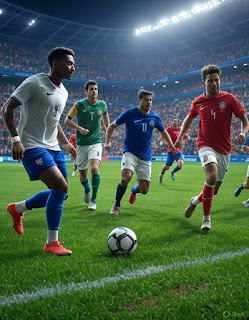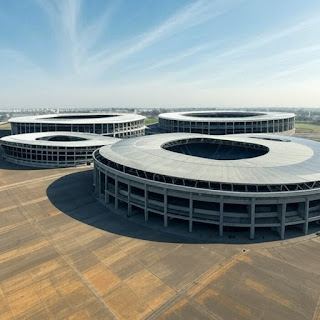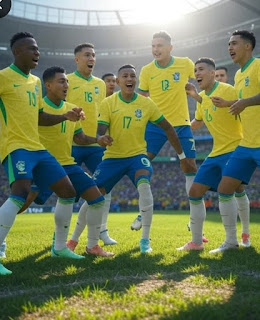The Road to 2026: A World Cup Like No Other
The FIFA World Cup is more than just a football tournament; it’s a global spectacle that unites nations, ignites passions, and showcases the pinnacle of athletic achievement. As we look ahead to 2026, the anticipation is already building for what promises to be a truly historic event. With an expanded format, multiple host nations, and a new generation of talent emerging, the 2026 FIFA World Cup is set to redefine the beautiful game.
A New Era: Expanded Format and Multi-National Hosts
For the first time in its history, the FIFA World Cup will feature 48 teams, a significant expansion from the previous 32-team format. This change, approved by FIFA in 2017, aims to provide more opportunities for nations worldwide to participate in the prestigious tournament. The expanded format will see teams divided into 12 groups of four, with the top two from each group, plus the eight best third-placed teams, advancing to a new Round of 32. This promises more matches, more drama, and more chances for underdog stories to unfold [1].
Adding to the historic nature of the 2026 World Cup is its unprecedented multi-national hosting. Three North American countries – the United States, Canada, and Mexico – will share the hosting duties across 16 vibrant cities. The United States will host the majority of the matches, with 11 cities, while Mexico will host in 3 cities and Canada in 2. This collaborative effort marks a new chapter in World Cup history, showcasing the diverse football cultures of the continent [2].
Host Cities:
- United States: Atlanta, Boston, Dallas, Houston, Kansas City, Los Angeles, Miami, New York/New Jersey, Philadelphia, San Francisco Bay Area, Seattle.
- Mexico: Guadalajara, Mexico City, Monterrey.
- Canada: Toronto, Vancouver.
The tournament is scheduled to take place from June 11 to July 19, 2026, with the opening match at the iconic Estadio Azteca in Mexico City and the final at MetLife Stadium in New Jersey [3].
Contenders and Rising Stars: Who Will Shine?
As the tournament draws closer, the perennial powerhouses of international football are already being touted as favorites. Spain, with its blend of experienced veterans and exciting young talents, is often cited as a top contender. Defending champions Argentina, led by their tactical mastermind Lionel Scaloni, will undoubtedly be a force to be reckoned with, aiming to defend their title. France, Brazil, and England also feature prominently in early predictions, boasting squads brimming with world-class players [4].
However, the World Cup is also a stage for new heroes to emerge. The 2026 edition is expected to showcase a plethora of rising stars who could define the tournament. Players like Jude Bellingham (England), Lamine Yamal (Spain), Florian Wirtz (Germany), and Endrick (Brazil) are just a few of the names generating buzz. Their youthful exuberance, combined with immense talent, could see them become household names by the end of the competition [5]. Keep an eye out for potential dark horses as well, with teams like Morocco, Mexico, and Japan often surprising expectations and making deep runs in the tournament [6].
Tactical Evolution: The Future of Football
The tactical landscape of football is constantly evolving, and the 2026 World Cup will undoubtedly reflect the latest trends. We can expect to see a continued emphasis on tactical flexibility, with teams capable of switching formations mid-game to adapt to different opponents and match situations. The importance of high-pressing strategies, quick transitions, and versatile players who can operate in multiple positions will likely remain paramount. Additionally, the unique conditions of playing across three different countries, with varying climates and altitudes, could influence tactical approaches and player conditioning [7].
Coaches will be meticulously analyzing data and leveraging sports science to gain every possible advantage. The integration of advanced analytics in player selection, opponent analysis, and in-game adjustments will be more sophisticated than ever. The tournament will be a fascinating display of how modern football tactics are implemented at the highest level.
The Impact and Legacy
The 2026 FIFA World Cup is poised to leave a lasting legacy, not just for the host nations but for global football as a whole. The expanded format will undoubtedly inspire more countries to invest in their football development programs, fostering growth and talent at a grassroots level. The shared hosting responsibilities will promote cross-cultural exchange and collaboration, strengthening the bonds between nations through the universal language of football.
Economically, the tournament is expected to generate significant revenue for the host cities through tourism, infrastructure development, and job creation. Beyond the economic impact, the World Cup will undoubtedly leave an indelible mark on the hearts and minds of millions, creating unforgettable memories and inspiring future generations of footballers and fans.
Conclusion
The 2026 FIFA World Cup is shaping up to be an extraordinary event, pushing the boundaries of what a global football tournament can be. With its expanded format, multi-national hosts, and the emergence of new talent, it promises to be a celebration of football’s enduring appeal and its power to unite the world. Get ready for a summer of thrilling matches, unexpected upsets, and the crowning of a new world champion.
References
[1] FIFA. How the FIFA World Cup 26™ will work with 48 teams.
[2] FIFA. Host Countries and Cities.
[3] InfoMoney. Copa do Mundo 2026: entenda como vai funcionar a venda de ingressos.
[4] FOX Sports. World Cup 2026 odds: Spain the favorite a year out from tournament.
[5] The New York Times. Ten players who could steal the show at the 2026 World Cup.
[6] NBC Miami. These are the early 2026 World Cup teams to watch and dark horses.
[7] Global Scarves. World Cup 2026 Predictions: Who Will Win & Why.



